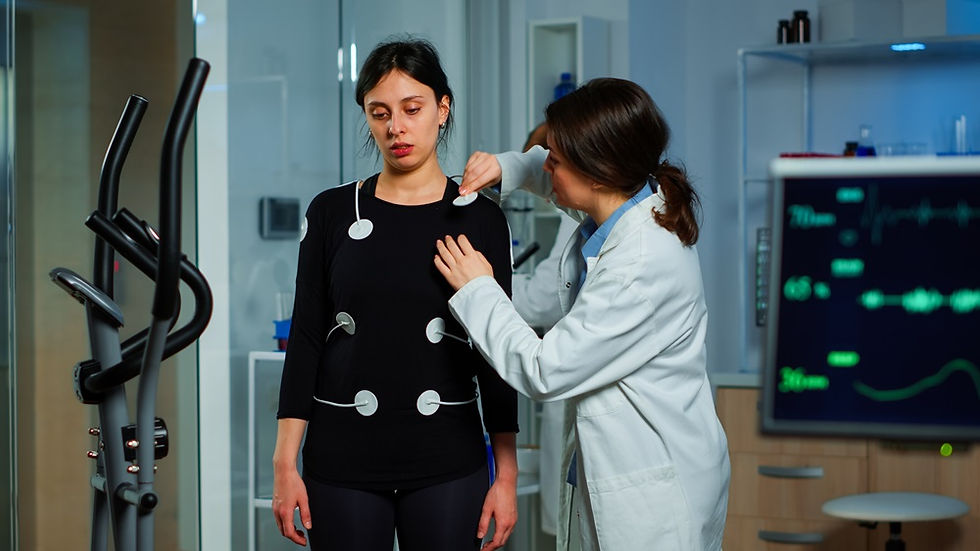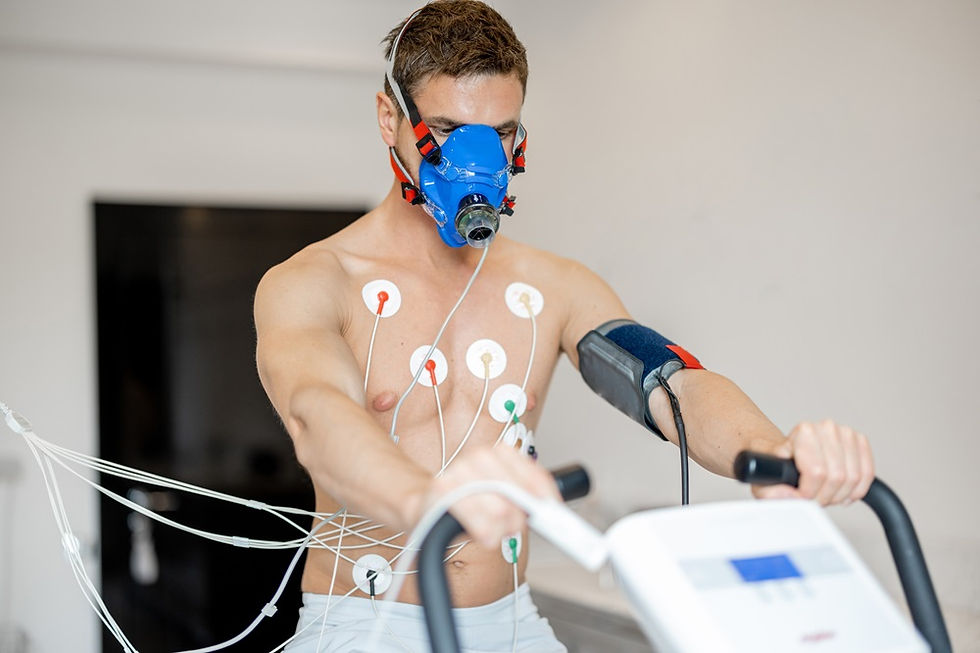How to Prepare for a Cardio Pulmonary Stress Test: A Complete Guide
- The Sun Rise Post
- Jul 31, 2025
- 5 min read

Medical tests can feel overwhelming, but proper preparation makes all the difference.
Whether you're facing a cardio pulmonary stress test or any other health evaluation, your physical and mental readiness directly impacts your results and overall experience.
Physical Preparation Sets the Foundation
Getting your body ready for testing isn't complicated, but it requires attention to detail.
Most tests require you to avoid eating anything for several hours beforehand, and this fasting period serves important purposes beyond just following doctor's orders.
Your cardiovascular system works differently when you're digested versus fasted.
Food affects your heart rate, blood pressure, and energy levels—all factors that medical tests measure.
You should also avoid all caffeine for 24 hours before your test, as caffeine interferes with accurate results. This means no coffee, tea, soft drinks, chocolate, or even strawberries.
Sleep becomes crucial in the days leading up to your test. Research shows that sleep deprivation can increase cortisol levels by up to 50%, which affects everything from your heart rate to your cognitive function.
Aim for 7-9 hours of quality sleep for at least three nights before your appointment.
Comfortable clothing makes a practical difference too—wear something that allows easy movement and access to your chest for monitoring equipment. Athletic shoes provide better stability during exercise portions of tests.
Mental Preparation Reduces Stress Impact
The psychological aspect of test preparation often gets overlooked, but it's just as important as the physical side.
Studies show that students have 15% more cortisol in their systems before high-stakes testing compared to regular days, and similar stress responses occur with medical tests.
Mindfulness-based stress reduction techniques have proven effective in reducing stress levels and improving emotional well-being.
You don't need weeks of meditation practice—even simple breathing exercises can help. Try the 4-7-8 technique: breathe in for 4 counts, hold for 7, and exhale for 8. Do this five times before your appointment.
Visualization works too. Spend a few minutes each day before your test imagining yourself calmly completing the procedure.
Picture the equipment, the staff, and yourself breathing normally throughout. This mental rehearsal reduces anxiety about the unknown.
Cardio Pulmonary Stress Test Preparation
For cardio pulmonary stress tests specifically, you'll need to stop any inhaled breathing medications 4 hours before your appointment. This includes rescue inhalers and breathing treatments.
However, continue taking all other prescribed medications unless your doctor says otherwise.
The test typically lasts 6-8 minutes of actual exercise, but plan to spend about an hour total at the facility.
You'll start with pulmonary function tests to evaluate your lung capacity, then move to the exercise portion where you'll ride a stationary bike while connected to monitoring equipment.
Don't worry about special exercise preparation beforehand. Each test is set up for your individual capabilities, and there's no need for special training. The goal is to measure your current fitness level, not test your athletic ability.
Preparation Timeline | Physical Actions | Mental Actions |
24 hours before | Stop caffeine, light meals only | Practice breathing exercises |
Night before | Early bedtime, prepare comfortable clothes | Visualization, avoid stressful media |
Morning of test | Fasting as directed, arrive early | Deep breathing, positive self-talk |
Managing Test Anxiety Effectively
Test anxiety affects university students significantly, with females, younger individuals, and those with lower academic performance showing higher anxiety levels.
The same patterns apply to medical testing—anxiety is normal and manageable.
Social support helps tremendously. Tell a friend or family member about your upcoming test. Having someone to talk through your concerns reduces their power over you.
The most practical coping methods involve social support and providing time for mental self-care through relaxation.
Research shows that students who engage in proper study preparation experience reduced test anxiety and improved performance.
The same principle applies to medical tests—understanding what to expect reduces anxiety.
Ask your healthcare provider to explain the procedure step by step. Most people feel more anxious about unknown elements than the actual test itself. Knowledge is anxiety's antidote.
Optimize Your Cognitive Performance
Your brain needs the right conditions to function optimally during testing.
Stress can impair working memory and the ability to process information effectively, which affects how well you follow instructions and communicate during your test.
Mindfulness training has shown improvements in cognitive flexibility and stress reduction.
Even a 10-minute mindfulness session before your appointment can help you stay focused and calm.
Stay hydrated, but not overly so. Dehydration affects cognitive function, but drinking too much water before a test that requires fasting creates discomfort. Sip water normally the day before, then follow your fasting instructions.

Your Recovery Starts Now
Academic stress research shows that individuals respond differently to stressful situations based on their biological and psychological makeup.
The same applies to medical testing—your preparation should match your personal stress response patterns.
If you typically feel anxious about medical procedures, start your mental preparation earlier.
If physical discomfort bothers you more than psychological stress, focus extra attention on your physical preparation.
Remember that optimal test results come from authentic preparation, not perfection. Your healthcare team wants accurate information about your current health status.
The goal isn't to achieve the "best" results, but to get the most accurate ones for your situation.
Proper preparation for medical tests, including procedures like cardio pulmonary stress testing, combines physical readiness with mental calm.
You have more control over your testing experience than you might think, and small preparation steps can make a significant difference in both your comfort and your results.
Frequently Asked Questions
Why do I need to fast before a medical test?
Answer: Fasting helps ensure accurate test results by removing the influence of digestion on your heart rate, blood pressure, and energy levels. Your cardiovascular system behaves differently when food is present in your system.
How long should I stop drinking caffeine before my test?
Answer: Avoid all caffeine for at least 24 hours before your test. This includes coffee, tea, energy drinks, chocolate, and even strawberries, as caffeine can interfere with test results.
How important is sleep before a medical test?
Answer: Very important. Lack of sleep raises cortisol levels (stress hormone) by up to 50%, which can affect your heart rate and mental clarity. Aim for 7–9 hours of quality sleep for at least three nights before your test.
What should I wear to a cardio pulmonary stress test?
Answer: Wear comfortable, loose-fitting clothes that allow easy movement and access to your chest for monitors. Athletic shoes are recommended for stability during exercise.
How do I mentally prepare for a medical test?
Answer: Use breathing techniques like the 4-7-8 method (inhale for 4, hold for 7, exhale for 8) and visualization—imagine yourself calmly completing the test. These lower stress and increase confidence.
What medications should I avoid before a cardio pulmonary stress test?
Answer: Avoid inhaled breathing medications (like rescue inhalers) for 4 hours before the test, unless told otherwise. Continue taking other prescribed medications unless your doctor advises differently.
Do I need to exercise to prepare for the test?
Answer:No special training is needed. The test is designed to match your current fitness level, not to assess athletic ability.



Comments